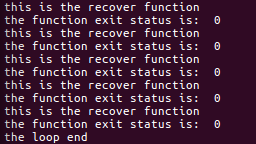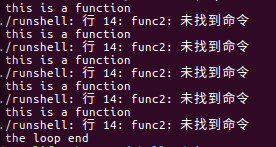- Rust+ChatBoxAI:实战
ChatboxAIChatboxAI是一款基于人工智能技术的智能助手工具,旨在通过自然语言交互帮助用户完成多种任务。以下是其核心功能与特点:功能概述多模型支持:可连接OpenAI、Claude、Gemini等主流大语言模型,用户能自由切换不同AI服务。本地运行:支持离线使用,数据隐私性较强,适合敏感信息处理场景。跨平台兼容:提供Windows、macOS和Linux客户端,同步支持移动端应用。核心
- windows 远程链接 Ubuntu 24.04 LTS 图形界面
Kasen's experience
#Ubuntuubuntulinux运维
Ubuntu24.04LTS方法一在UBUNTU24.04上开启远程桌面ubuntu24.04设置远程桌面其他参考在Ubuntu22.04上使用xrdp启用远程桌面协议实现图形化使用Windows远程桌面工具来远程连接控制Ubuntu系统windows远程桌面rdp连接ubuntu图形桌面这个办法需要再ubuntu已经登录且没有休眠情况下才可以连接。
- 本地webrtc应用, 本来是http协议,在安卓手机上浏览器不支持使用麦克风,现在用了ngixn用了改成https协议安卓手机上浏览器支持麦克风了,但是又没有视频图像了
玩人工智能的辣条哥
疑难杂症专题httpwebrtc智能手机
环境:WSL2Ubuntu22.04本地部署webrtc应用视频聊天应用问题描述:本地webrtc应用,本来是http协议,在安卓手机上浏览器不支持使用麦克风,现在用了ngixn用了改成https协议安卓手机上浏览器支持麦克风了,但是又没有视频图像了,这怎么解决?解决方案:在WebRTC应用中,从HTTP切换到HTTPS是一个重要的步骤,因为它提供了加密和安全的数据传输,这对于浏览器访问麦克风和摄
- ec2-user 1234 0.1 0.2 123456 7890 pts/0 S+ 12:34 0:00 java -jar my-java-service.jar
HainesFreeman
javajavajar开发语言
ec2-user12340.10.21234567890pts/0S+12:340:00java-jarmy-java-service.jar这里的1234,123456,7890分别代表什么?psaux|grepjava在Linux系统中,psaux命令的输出包含多个字段,每个字段都有特定的含义。以下是对psaux输出中常见字段的解释,特别是你提到的1234、123456和7890这三个数字的含
- Linux中Centos和Ubuntu的区别是什么?
老男孩IT教育
linuxcentosubuntu
Linux是一种免费使用和自由传播的类UNIX操作系统,拥有众多发行版本,其中最受欢迎的就是Centos和Ubuntu,各自具有独特的特点和优势,那么Linux中Centos和Ubuntu的区别是什么?具体请看下文。CentOS和Ubuntu都是流行的Linux发行版,但它们在用途和目标用户方面存在一些关键差异。起源和目标CentOS是RedHatEnterpriseLinux的一个免费和开源版本
- Binder跨进程通信机制
四喜汤圆
一、相关概念进程空间把进程空间分为用户空间和内核空间。进程间:用户空间不可共享,内核空间可以共享,所有进程共用一个内核空间。用户空间和内核空间的交互通过系统调用。copy_from_user:将数据从用户空间拷贝到内核空间copy_to_user:将数据从内核空间拷贝到用户空间进程隔离在Linux中,虚拟内存机制为每个进程分配了线性连续的内存空间,OS将这种虚拟内存空间映射到物理内存空间。-->每
- #Linux内存管理# 假设使用printf打印指针bufA和bufB指向的地址是一样的,那么在内核中这两块虚拟内存是否“打架”了呢?
不,在内核中这两块虚拟内存不会“打架”。原因在于虚拟内存的工作原理和内核的管理机制。下面我将详细解释,基于你描述的场景:假设在同一个进程或不同进程中,使用printf打印出的bufA和bufB的虚拟地址值相同。关键点:虚拟地址是进程本地的用户空间虚拟地址的含义:printf打印的地址是用户空间的虚拟地址(VirtualAddress)。每个进程都有自己的虚拟地址空间,由操作系统内核通过内存管理单元
- #Linux内存管理# vm_normal_page()函数返回的什么样页面的struct page数据结构?为什么内存管理代码中需要这个函数?
vm_normal_page()函数是Linux内核内存管理的一个关键且微妙的函数,其职责和返回结果需要深入理解。下面详细解释:1.vm_normal_page()返回什么样的structpage?vm_normal_page()函数接收一个有效的、已经存在于物理内存中的页表项(PTE)作为输入(即pte_present(pte)必须为true),然后返回一个指向与该PTE所映射的物理页帧相对应的
- KVM中使用桥接模式.运维就业技术教程
在KVM中使用桥接模式可以让虚拟机直接接入物理网络,使其成为局域网中的独立节点。以下是配置和使用桥接模式的详细指南:一、桥接模式原理作用:虚拟机通过宿主机的网桥(如virbr0)直接与物理交换机/路由器通信,获得与宿主机相同的网段IP。特点:虚拟机拥有独立IP,可被局域网内其他设备直接访问。无需NAT转换,网络性能更高。需确保宿主机网桥已正确配置。二、配置步骤1.创建网桥接口大多数Linux发行版
- bash-completion未安装或未启用
teayear
bash开发语言
在Linux系统中,按下Tab键无法触发自动补全或提示的情况,通常是由以下原因导致的。以下是具体分析和解决方案:一、常见原因及解决方案1.bash-completion未安装或未启用原因:bash-completion是提供命令补全功能的核心工具,部分Linux发行版(如CentOS)默认未安装此工具。解决方案:#安装bash-completionsudoyuminstall-ybash-comp
- Linux 命令:uname
hweiyu00
Linux命令linux运维服务器
Linuxuname命令详细教程uname(UnixName)是Linux系统中用于获取系统基本信息的基础命令。它能快速展示操作系统、内核、主机名等关键信息,是系统诊断和环境确认的常用工具。资料已经分类整理好:https://pan.quark.cn/s/26d73f7dd8a7一、基本语法uname[选项]核心功能:默认只显示操作系统名称(如Linux)。通过选项可获取更详细的系统信息。二、常用
- Linux进程间通信--命名管道
目录1、什么是命名管道1.1命名管道的创建和使用1.2、命名管道的工作原理1.3、命名管道与匿名管道的区别2.命名管道的特点及特殊场景2.1特点2.2四种特殊场景3.日志类的模拟3.1可变参数的利用3.2time()函数和structtm类的介绍3.3日期类的实现1、什么是命名管道命名管道是一种在文件系统中存在的特殊文件类型,它允许不同进程通过文件名(即“命名”)来访问和进行通信。与匿名管道相比,
- 个人笔记(linux/sort与uniq命令)
sort命令(排序)功能:行排序核心语法:sort[选项][文件]常用选项:选项作用示例-n数值排序sort-n-r降序排序sort-nr-k指定排序列sort-k2,2n-t指定分隔符sort-t':'-k3n-u去重(相当于uniq)sort-u典型用法:#按第二列数字降序排序sort-k2,2nrdata.txt#处理CSV文件(以逗号分隔)sort-t','-k3ndata.csv注意事项
- windows下jar包配置为开机自启动
在jar包目录新建一个start.bat文件,然后写入启动命令java-jarX.jar2.仍然在此目录,新建start.vbs文件,然后写入一下命令,命令最后一个0是隐藏窗口运行createobject("wscript.shell").run"D:\start.bat",03.创建run.vbs的快捷方式,移动到开机自启动目录下:C:\ProgramData\Microsoft\Windows
- inotify-tools监控文件的变动情况
Tim在路上
在实际的生产中,都会存在不同系统的对接问题,比如A系统将数据生产后存放到/data文件下,B系统需要监控/data文件夹下数据的变动情况,来做出调整,linux系统中inotify-tools正好可以完成系统的监控而supervise正好可以完成进程的持续监控,起到出错重启的效果。inotify-toolsinotify-tools下载地址:http://github.com/downloads/
- 通过 Ollama 获取并运行本地大型语言模型(LLM)
Ollama是一个开源工具,专为在本地机器上便捷部署和运行大型语言模型(LLM)而设计。它支持多种操作系统(Windows、macOS、Linux),并提供简单的命令行接口和API,适合开发者、研究人员以及对数据隐私有较高要求的用户。本文档将详细指导您如何通过Ollama在本地获取和运行LLM。1.准备工作在开始之前,请确保您的系统满足以下要求:操作系统:Windows、macOS或Linux(支
- 软件测试理论基础、质量保证常见面试题
程序员阿沐
全面掌握软件测试理论基础、文档编写,测试流程1.测试分为哪几个阶段?⒉谈谈你之前测试的项目流程,在每个阶段的输出有哪些?3.谈谈敏捷模式的认识?4.linux常见查看日志命令有哪些?5.线上质量BUG频频爆发怎么办?6.如何分析一个bug是前端还是后端的问题?这些问题你一定要能够很全面的表述出来。比如说我现在是面试官,我第一个肯定不会去问你哪些代码的问题,也不会问你自动化、测试开发的问题。第一个查
- Linux+Python实战课堂:笔记、练习与应用
本文还有配套的精品资源,点击获取简介:本压缩包提供全面的Linux学习资源和Python编程练习,旨在帮助初学者和IT从业者深入理解Linux系统及其技能,并通过Python编程练习巩固相关技能。涵盖Linux基础概念、文件系统、命令行操作、文本编辑器使用、用户和组管理、软件管理、进程监控、网络配置以及系统性能监控等多个方面。同时,包含Python基础语法、函数与模块、面向对象编程、文件操作、异常
- 【立创泰山派】Linux驱动之UART驱动程序
Monisa_sama
linux单片机运维
Linux串口驱动前言1.串口通信2.调试和测试3.性能分析4.扩展串口功能一、基础知识1.什么是串口1.1波特率2.通信协议2.1UART帧结构2.2校验方式二、硬件接口1.基于TTL的UART通讯2.基于RS232的UART通讯3.基于RS485的UART通讯三、软件框架1.驱动子系统框架1.1串口驱动程序位置1.2使用8250驱动的方式1.3串口设备的调试方法2.注册流程分析3.设备树配置3
- buildroot+qemu+arm64虚拟环境多种方式启动linux内核
左家垅的牛
linux运维服务器
Qemu:QEMU是一款开源的硬件虚拟化软件,可以在不同的主机平台上运行虚拟机。它通过动态的二进制转换,模拟CPU,并且提供一组设备模型,使它能够运行多种未修改的客户机OS。QEMU采用全系统仿真,可以模拟完整的计算机系统,包括处理器、内存、存储和外围设备。它提供硬件仿真,允许在一个虚拟环境中运行不同体系结构的操作系统和应用程序。QEMU可以与KVM一起使用,进而接近本地速度运行虚拟机。目前,QE
- 【Linux】权限详解 权限本质、权限属性、su、sudo提权、chmod\chown\chgrp、文件类别
文章目录一、权限的认识二、linux的权限本质三、linux的用户su指令sudo提权四、linux角色五、文件权限属性六、修改权限的指令操作chmod指令(权限只会验证一次)chown/chgrp指令修改文件权限的八进制方案七、文件类别详解一、权限的认识什么是权限?生活中处处都有权限,本质就是你要做一件事能还是不能的问题,有权限就能做,没权限就算你想做也不能做为什么linux要有权限?首先lin
- LNMP的安装记录
Jay_MIng
linuxphp运维nginxmysql
Linux可以使用虚拟机挂载使用Centos、Debian、Ubunto等的一些镜像,有条件的话可以使用阿里云的系统,本文使用的就是阿里云的x86_64x86_64x86_64GNU/Linux系统,虚拟机安装不做详解,可以自行搜索,或者有疑问可以提出一起探讨安装PHP1、下载解压wgethttp://cn2.php.net/distributions/php-7.2.8.tar.gztar-xz
- CSS面试题及详细答案140道之(101-120)
还是大剑师兰特
前后端面试题css大剑师CSS面试题
《前后端面试题》专栏集合了前后端各个知识模块的面试题,包括html,javascript,css,vue,react,java,Openlayers,leaflet,cesium,mapboxGL,threejs,nodejs,mangoDB,MySQL,Linux…。前后端面试题-专栏总目录文章目录一、本文面试题目录101.解释`text-indent`属性的作用。102.如何在CSS中实现响应
- 报错解决:/usr/bin/python^M: bad interpreter: No such file or directory
KimmyDs
linux运维服务器
报错问题分析:这是不同系统编码格式引起的:在windows系统中编辑的.sh.py文件可能有不可见字符,所以在Linux系统下执行会报以上异常信息。一般是因为windows行结尾和linux行结尾标识不同造成的。问题解决:1)在windows下转换:利用一些编辑器如UltraEdit或EditPlus等工具先将脚本编码转换,再放到Linux中执行。转换方式如下(UltraEdit):File-->
- Filebeat + Logstash + ES进行Nginx日志采集
一个只会喊666的菜比
简易架构图service.png架构图比较简单,日志收集大同小异,这次不添加任何中间服务比如:rediskafka后端只是存储进ES使用的版本jdk-8u161-linux-x64.rpmelasticsearch-6.7.2.rpmlogstash-6.7.2.rpmfilebeat-6.7.2-x86_64.rpm安装比较简单,只用进行rpm-ivh即可,接下来直接贴配置文件:Elastics
- Failed to fetch http://packages.ros.org.ros/ubuntu/dists/xenial/InRelease
尝试了将地址修改成http://packages.ros.org/ros/ubuntu/dists/xenial/InRelease,更差;尝试了sudorm-f/etc/apt/sources.list.d/ros-latest.list/binary-amd64/Packages不建议这么做。过了一阵子,自己好了!!!!总结:查看自己网络连接,或者等一会再update,自己就好了。
- 头歌实践JAVA项目开发实战入门--第10阶段【Linux操作系统】
开始更新头歌了!!!有需要的小伙伴自取吧;有什么好的建议也可以评论区留言,大家一起共勉!Linux操作系统一、Linux初体验#!/bin/bash#在以下部分写出完成任务的命令#*********begin*********#cd/ls-a#*********end*********#二、Linux常用命令#!/bin/bash#在以下部分写出完成任务的命令#*********begin****
- docker 安装Home Assistant
铭keny
HomeAssistantdocker容器运维
一、安装docker1、先切换到root用户,先安装一些基本环境:yuminstall-yyum-utilsdevice-mapper-persistent-datalvm22、添加阿里云软件源yum-config-manager--add-repohttp://mirrors.aliyun.com/docker-ce/linux/centos/docker-ce.repo3、然后安装Docker
- HKUST-Aerial-Robotics/VINS-Mono 测试过程中遇到的问题
Kris_u
Linuxlinux
ubuntu18.041、sudoapt-getupdate失败:GPGerror:http://packages.ros.org/ros/ubuntubionicInRelease:详细错误信息:Thefollowingsignatureswereinvalid:EXPKEYSIGF42ED6FBAB17C654OpenRoboticsW:Failedtofetchhttp://packages
- Windows 11 上的 Android 应用程序的工作方式
QWERTY_18fb
微软的Windows11公告令我们惊讶的是,即将推出的操作系统将在Windows应用程序旁边运行Android应用程序。不幸的是,主题演讲在细节上很简单。这些应用程序会使用仿真吗?是否会涉及Windows现有的Linux支持?我们在主题演讲后不久就得到了答案,这要归功于后续的开发人员谈话,其中详细介绍了一些细节。该功能正式称为“适用于Android的Windows子系统”,它应该会告诉您很多有关其
- 数据采集高并发的架构应用
3golden
.net
问题的出发点:
最近公司为了发展需要,要扩大对用户的信息采集,每个用户的采集量估计约2W。如果用户量增加的话,将会大量照成采集量成3W倍的增长,但是又要满足日常业务需要,特别是指令要及时得到响应的频率次数远大于预期。
&n
- 不停止 MySQL 服务增加从库的两种方式
brotherlamp
linuxlinux视频linux资料linux教程linux自学
现在生产环境MySQL数据库是一主一从,由于业务量访问不断增大,故再增加一台从库。前提是不能影响线上业务使用,也就是说不能重启MySQL服务,为了避免出现其他情况,选择在网站访问量低峰期时间段操作。
一般在线增加从库有两种方式,一种是通过mysqldump备份主库,恢复到从库,mysqldump是逻辑备份,数据量大时,备份速度会很慢,锁表的时间也会很长。另一种是通过xtrabacku
- Quartz——SimpleTrigger触发器
eksliang
SimpleTriggerTriggerUtilsquartz
转载请出自出处:http://eksliang.iteye.com/blog/2208166 一.概述
SimpleTrigger触发器,当且仅需触发一次或者以固定时间间隔周期触发执行;
二.SimpleTrigger的构造函数
SimpleTrigger(String name, String group):通过该构造函数指定Trigger所属组和名称;
Simpl
- Informatica应用(1)
18289753290
sqlworkflowlookup组件Informatica
1.如果要在workflow中调用shell脚本有一个command组件,在里面设置shell的路径;调度wf可以右键出现schedule,现在用的是HP的tidal调度wf的执行。
2.designer里面的router类似于SSIS中的broadcast(多播组件);Reset_Workflow_Var:参数重置 (比如说我这个参数初始是1在workflow跑得过程中变成了3我要在结束时还要
- python 获取图片验证码中文字
酷的飞上天空
python
根据现成的开源项目 http://code.google.com/p/pytesser/改写
在window上用easy_install安装不上 看了下源码发现代码很少 于是就想自己改写一下
添加支持网络图片的直接解析
#coding:utf-8
#import sys
#reload(sys)
#sys.s
- AJAX
永夜-极光
Ajax
1.AJAX功能:动态更新页面,减少流量消耗,减轻服务器负担
2.代码结构:
<html>
<head>
<script type="text/javascript">
function loadXMLDoc()
{
.... AJAX script goes here ...
- 创业OR读研
随便小屋
创业
现在研一,有种想创业的想法,不知道该不该去实施。因为对于的我情况这两者是矛盾的,可能就是鱼与熊掌不能兼得。
研一的生活刚刚过去两个月,我们学校主要的是
- 需求做得好与坏直接关系着程序员生活质量
aijuans
IT 生活
这个故事还得从去年换工作的事情说起,由于自己不太喜欢第一家公司的环境我选择了换一份工作。去年九月份我入职现在的这家公司,专门从事金融业内软件的开发。十一月份我们整个项目组前往北京做现场开发,从此苦逼的日子开始了。
系统背景:五月份就有同事前往甲方了解需求一直到6月份,后续几个月也完
- 如何定义和区分高级软件开发工程师
aoyouzi
在软件开发领域,高级开发工程师通常是指那些编写代码超过 3 年的人。这些人可能会被放到领导的位置,但经常会产生非常糟糕的结果。Matt Briggs 是一名高级开发工程师兼 Scrum 管理员。他认为,单纯使用年限来划分开发人员存在问题,两个同样具有 10 年开发经验的开发人员可能大不相同。近日,他发表了一篇博文,根据开发者所能发挥的作用划分软件开发工程师的成长阶段。
初
- Servlet的请求与响应
百合不是茶
servletget提交java处理post提交
Servlet是tomcat中的一个重要组成,也是负责客户端和服务端的中介
1,Http的请求方式(get ,post);
客户端的请求一般都会都是Servlet来接受的,在接收之前怎么来确定是那种方式提交的,以及如何反馈,Servlet中有相应的方法, http的get方式 servlet就是都doGet(
- web.xml配置详解之listener
bijian1013
javaweb.xmllistener
一.定义
<listener>
<listen-class>com.myapp.MyListener</listen-class>
</listener>
二.作用 该元素用来注册一个监听器类。可以收到事件什么时候发生以及用什么作为响
- Web页面性能优化(yahoo技术)
Bill_chen
JavaScriptAjaxWebcssYahoo
1.尽可能的减少HTTP请求数 content
2.使用CDN server
3.添加Expires头(或者 Cache-control) server
4.Gzip 组件 server
5.把CSS样式放在页面的上方。 css
6.将脚本放在底部(包括内联的) javascript
7.避免在CSS中使用Expressions css
8.将javascript和css独立成外部文
- 【MongoDB学习笔记八】MongoDB游标、分页查询、查询结果排序
bit1129
mongodb
游标
游标,简单的说就是一个查询结果的指针。游标作为数据库的一个对象,使用它是包括
声明
打开
循环抓去一定数目的文档直到结果集中的所有文档已经抓取完
关闭游标
游标的基本用法,类似于JDBC的ResultSet(hasNext判断是否抓去完,next移动游标到下一条文档),在获取一个文档集时,可以提供一个类似JDBC的FetchSize
- ORA-12514 TNS 监听程序当前无法识别连接描述符中请求服务 的解决方法
白糖_
ORA-12514
今天通过Oracle SQL*Plus连接远端服务器的时候提示“监听程序当前无法识别连接描述符中请求服务”,遂在网上找到了解决方案:
①打开Oracle服务器安装目录\NETWORK\ADMIN\listener.ora文件,你会看到如下信息:
# listener.ora Network Configuration File: D:\database\Oracle\net
- Eclipse 问题 A resource exists with a different case
bozch
eclipse
在使用Eclipse进行开发的时候,出现了如下的问题:
Description Resource Path Location TypeThe project was not built due to "A resource exists with a different case: '/SeenTaoImp_zhV2/bin/seentao'.&
- 编程之美-小飞的电梯调度算法
bylijinnan
编程之美
public class AptElevator {
/**
* 编程之美 小飞 电梯调度算法
* 在繁忙的时间,每次电梯从一层往上走时,我们只允许电梯停在其中的某一层。
* 所有乘客都从一楼上电梯,到达某层楼后,电梯听下来,所有乘客再从这里爬楼梯到自己的目的层。
* 在一楼时,每个乘客选择自己的目的层,电梯则自动计算出应停的楼层。
* 问:电梯停在哪
- SQL注入相关概念
chenbowen00
sqlWeb安全
SQL Injection:就是通过把SQL命令插入到Web表单递交或输入域名或页面请求的查询字符串,最终达到欺骗服务器执行恶意的SQL命令。
具体来说,它是利用现有应用程序,将(恶意)的SQL命令注入到后台数据库引擎执行的能力,它可以通过在Web表单中输入(恶意)SQL语句得到一个存在安全漏洞的网站上的数据库,而不是按照设计者意图去执行SQL语句。
首先让我们了解什么时候可能发生SQ
- [光与电]光子信号战防御原理
comsci
原理
无论是在战场上,还是在后方,敌人都有可能用光子信号对人体进行控制和攻击,那么采取什么样的防御方法,最简单,最有效呢?
我们这里有几个山寨的办法,可能有些作用,大家如果有兴趣可以去实验一下
根据光
- oracle 11g新特性:Pending Statistics
daizj
oracledbms_stats
oracle 11g新特性:Pending Statistics 转
从11g开始,表与索引的统计信息收集完毕后,可以选择收集的统信息立即发布,也可以选择使新收集的统计信息处于pending状态,待确定处于pending状态的统计信息是安全的,再使处于pending状态的统计信息发布,这样就会避免一些因为收集统计信息立即发布而导致SQL执行计划走错的灾难。
在 11g 之前的版本中,D
- 快速理解RequireJs
dengkane
jqueryrequirejs
RequireJs已经流行很久了,我们在项目中也打算使用它。它提供了以下功能:
声明不同js文件之间的依赖
可以按需、并行、延时载入js库
可以让我们的代码以模块化的方式组织
初看起来并不复杂。 在html中引入requirejs
在HTML中,添加这样的 <script> 标签:
<script src="/path/to
- C语言学习四流程控制if条件选择、for循环和强制类型转换
dcj3sjt126com
c
# include <stdio.h>
int main(void)
{
int i, j;
scanf("%d %d", &i, &j);
if (i > j)
printf("i大于j\n");
else
printf("i小于j\n");
retu
- dictionary的使用要注意
dcj3sjt126com
IO
NSDictionary *dict = [NSDictionary dictionaryWithObjectsAndKeys:
user.user_id , @"id",
user.username , @"username",
- Android 中的资源访问(Resource)
finally_m
xmlandroidStringdrawablecolor
简单的说,Android中的资源是指非代码部分。例如,在我们的Android程序中要使用一些图片来设置界面,要使用一些音频文件来设置铃声,要使用一些动画来显示特效,要使用一些字符串来显示提示信息。那么,这些图片、音频、动画和字符串等叫做Android中的资源文件。
在Eclipse创建的工程中,我们可以看到res和assets两个文件夹,是用来保存资源文件的,在assets中保存的一般是原生
- Spring使用Cache、整合Ehcache
234390216
springcacheehcache@Cacheable
Spring使用Cache
从3.1开始,Spring引入了对Cache的支持。其使用方法和原理都类似于Spring对事务管理的支持。Spring Cache是作用在方法上的,其核心思想是这样的:当我们在调用一个缓存方法时会把该方法参数和返回结果作为一个键值对存放在缓存中,等到下次利用同样的
- 当druid遇上oracle blob(clob)
jackyrong
oracle
http://blog.csdn.net/renfufei/article/details/44887371
众所周知,Oracle有很多坑, 所以才有了去IOE。
在使用Druid做数据库连接池后,其实偶尔也会碰到小坑,这就是使用开源项目所必须去填平的。【如果使用不开源的产品,那就不是坑,而是陷阱了,你都不知道怎么去填坑】
用Druid连接池,通过JDBC往Oracle数据库的
- easyui datagrid pagination获得分页页码、总页数等信息
ldzyz007
var grid = $('#datagrid');
var options = grid.datagrid('getPager').data("pagination").options;
var curr = options.pageNumber;
var total = options.total;
var max =
- 浅析awk里的数组
nigelzeng
二维数组array数组awk
awk绝对是文本处理中的神器,它本身也是一门编程语言,还有许多功能本人没有使用到。这篇文章就单单针对awk里的数组来进行讨论,如何利用数组来帮助完成文本分析。
有这么一组数据:
abcd,91#31#2012-12-31 11:24:00
case_a,136#19#2012-12-31 11:24:00
case_a,136#23#2012-12-31 1
- 搭建 CentOS 6 服务器(6) - TigerVNC
rensanning
centos
安装GNOME桌面环境
# yum groupinstall "X Window System" "Desktop"
安装TigerVNC
# yum -y install tigervnc-server tigervnc
启动VNC服务
# /etc/init.d/vncserver restart
# vncser
- Spring 数据库连接整理
tomcat_oracle
springbeanjdbc
1、数据库连接jdbc.properties配置详解 jdbc.url=jdbc:hsqldb:hsql://localhost/xdb jdbc.username=sa jdbc.password= jdbc.driver=不同的数据库厂商驱动,此处不一一列举 接下来,详细配置代码如下:
Spring连接池
- Dom4J解析使用xpath java.lang.NoClassDefFoundError: org/jaxen/JaxenException异常
xp9802
用Dom4J解析xml,以前没注意,今天使用dom4j包解析xml时在xpath使用处报错
异常栈:java.lang.NoClassDefFoundError: org/jaxen/JaxenException异常
导入包 jaxen-1.1-beta-6.jar 解决;
&nb




